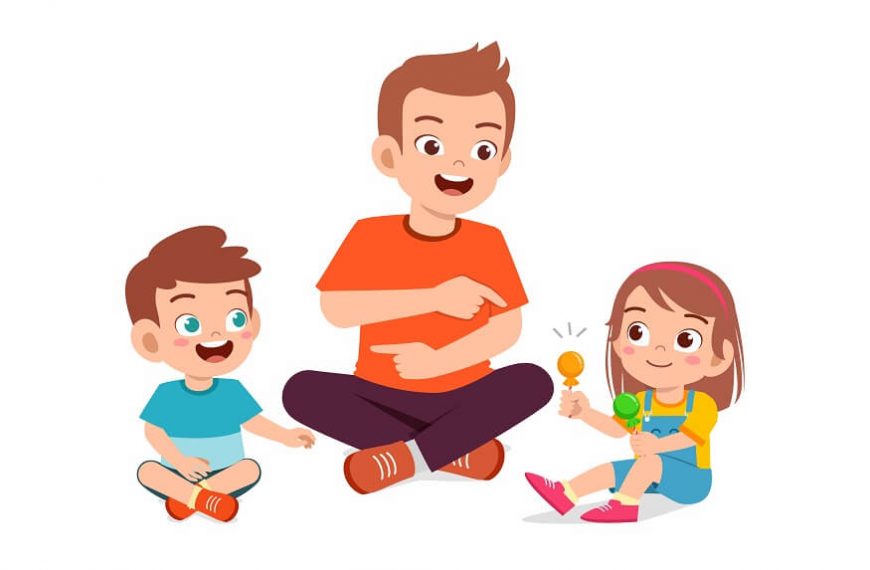Sharing is an important social skill that shapes a child’s growth. But when it comes to giving up their toys and other possessions, toddlers frequently show hesitation. It might be difficult for parents and other carers to comprehend this behaviour and deal with it in a productive way. In this essay, we will examine the causes of a toddler’s unwillingness to share as well as doable tactics that can promote cooperation and a sharing mindset in young children.
Understanding Toddler Behaviour
- Developmental Stage:
- Sense of Ownership:
Toddlers are in a period of development known as egocentrism, where they find it difficult to completely understand the needs and viewpoints of others. Their main priorities are their personal wants and getting what they want now. As a result, sharing may be viewed as a threat to their sense of ownership and control.
Children are exploring their newfound independence and establishing autonomy during their toddler years. For them, sharing importance can feel like giving up ownership of their goods, which can be difficult. We need to make them realise why sharing is important.
Sharing can be interpreted by toddlers as ceding control over something they view as their own because they are extremely territorial about their possessions. They could worry that they won’t get to play with them anymore or that someone else will harm or take them away.
In relation to their toys, toddlers frequently have a strong sense of ownership and attachment. When requested to share, they could experience fear or a sense of loss because it puts their possession and control of their priceless possessions into question. Understanding toddler behaviour is of utmost importance.
Importance and Benefits of Sharing
- Social Skills Development:
- Emotional Intelligence:
- Conflict Resolution:
Important social qualities like empathy, cooperation, and compromise are taught to kids through sharing. Sharing teaches kids to take into account others’ wants and feelings, which improves their capacity to forge enduring bonds later in life.
By comprehending and valuing the viewpoints and desires of others, sharing aids youngsters in the development of empathy. It encourages teamwork and the capacity for collaboration in the pursuit of a common objective.
As they learn to control their emotions and cope with frustration or disappointment when others get to use a toy or object before them, toddlers who share gain emotional intelligence.
Toddlers must learn to control their emotions and exercise patience in order to share, which helps them grow emotionally. It aids individuals in developing coping mechanisms for unpleasant feelings and means of positive self-expression.
Sharing promotes the ability to resolve conflicts and solve problems. Toddlers acquire the bargaining, turn-taking, and communication skills necessary for resolving disagreements in a variety of social circumstances by navigating the importance of sharing situations.
When kids share, they come across circumstances where disputes could happen. These experiences give kids a chance to develop their communication and negotiation skills as well as their ability to come to mutually agreeable solutions.
Strategies to Encourage Cooperation
- Lead by Example:
- Teach Empathy:
- Establish Rules and Routines:
- Provide Alternatives:
- Praise and Encouragement:
- Playdates and Social Interactions:
Children learn best by imitation, so set an example of the benefits of sharing by doing it yourself. Talk about the delight and satisfaction that come from helping others with your child.
Your child is more likely to internalise and imitate the behaviour if they witness you engaging in it and exhibiting happiness while doing so. Show the advantages of sharing by setting an example with your behaviour.
Use simple language and explanations to help young children understand how their actions influence others. Encourage them to envision how it feels to share with others as well as how it feels to receive a gift.
Discussions regarding emotions and viewpoints should be had with your youngster. By describing instances where the benefits of sharing made someone happy or improved their self-esteem, you can aid your students in developing empathy.
Establish norms for sharing that are clear and consistent, and consistently remind people of them. To promote comprehension, establish guidelines for turn-taking and explain the rationale behind them.
Create rules that are age-appropriate and spell out what sharing is expected of you. Explain the laws and their significance in clear language. Make sure to constantly enforce the rules so that kids understand their importance and feel confident in the established routine.
Offer substitutes or advise sharing other toys when disputes erupt over a particular toy. With this method, toddlers can practise sharing without having to give up their most valued belongings.
Recognize that certain toys might be especially meaningful to your youngster. Offer alternatives that can satiate their desire for possession while yet encouraging sharing rather than concentrating entirely on particular objects. They gain a sense of flexibility and a willingness to compromise as a result of this.
Recognize and applaud your child’s attempts to share, even if they only do so briefly. Children are encouraged to continue sharing when they receive positive feedback, which reinforces the behaviour.
Honour and praise your child’s sharing actions. Highlight their efforts and the beneficial effects of their sharing by giving them special praise. This acknowledgment motivates kids to continue sharing in the future and reinforces the behaviour.
Set up playdates or take part in group activities that promote sharing. Toddlers are exposed to beneficial peer-sharing situations and valuable practice through these possibilities.
Provide your youngster with the opportunity to socialise with other kids in environments where children sharing is valued. Playdates, neighbourhood gatherings, or organised activities can all help with this. They can pick up tips from their peers and experience rewarding sharing in these settings.
Parents and other adults who want to encourage collaboration and the development of social skills in their kids must be aware of toddlers’ resistance to sharing. Sharing goes against their developmental inclinations, therefore by acknowledging this, we may approach the situation with empathy and use powerful techniques to promote children sharing. Keep in mind that sharing is a skill that can be encouraged and improved over time rather than a natural behaviour. We may encourage toddlers to value sharing and benefit from its advantages for their social and emotional development by setting an example, teaching empathy, and offering alternatives. It’s important to understand why sharing is important.
Think about EuroKids to give your child a nurturing and encouraging environment that promotes sharing and the growth of social skills. EuroKids offers a child-centred approach and skilled educators.















